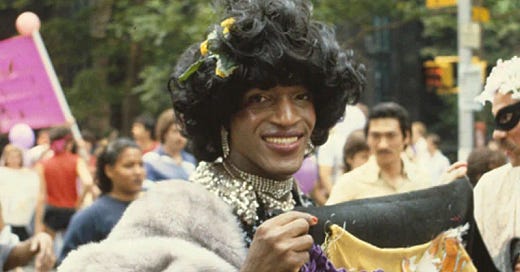Dear Readers,
Last week’s Article Club Roll Call was heartwarming. Thank you to everyone who said hi. I’m keeping it open this week because I want to encourage everyone (especially newer subscribers!) to take the plunge. You can write anything, but if you’d like a prompt: Who are you? Why did you subscribe to Article Club? What do you appreciate about it, and what do you hope for Article Club in its second decade?
Now let’s head to this week’s issue — which is a pretty good one, I must say. (It helped that school ended last Tuesday.) The lead piece, “Before the Bricks,” is a must-read, in my opinion, as we move through Pride Month. Author Saint Trey W. discusses the myth of Stonewall, the curation of history in order to comfort white people, and the erasure of Black and brown trans women, sex workers, street queens, houseless youth, and femmes who have led the LGBTQ+ rights movement.
If an article on queerness doesn’t interest you, check out these selections — two articles, plus a video that will calm and enthrall you:
Hope you enjoy this week’s issue and hope you have a great weekend ahead. One last thing: I’m always looking for articles worthy of our readership. Got one? Don’t hide it, recommend it! All you need to do is click the button below.
⭐️🎉🥳 Come celebrate Article Club’s 500th issue! We’re meeting up in Oakland at Room 389 on Thursday, June 26, beginning at 5:30 pm. Get your free ticket here.
1️⃣ Before the Bricks
I predict: This is the first of many essays by that you will find here. Please take in their words, preferably slowly. Here’s an excerpt:
Pride does not mean the same thing to us. White queerness has often been allowed to assimilate to trade resistance for access, militancy for marketability. And in doing so, it has made Pride into something safe, something purchasable. A day off, a drink special, a rainbow decal on a cop car.
But for us, Black, queer, trans, broke, displaced, Pride has never been safe. It has never been just a party. We do not get to forget the funeral just because we are wearing sequins.
Our presence in white-dominated Pride spaces is often conditional, welcomed for optics, rejected in practice. We are stared at, over-policed, hyper-visible when they want to tokenize us, invisible when we demand power. Police stand at Pride not as allies, but as reminders. And even in celebration, we are watched. Profiled, beaten, killed. We are asked to dance with the same boots that crushed our kin.
That is why Black Pride exists, not to divide, but to survive. Because when your laughter is seen as too loud, your body as too much, your gender as too threatening, your joy must be held in rooms that understand it. Rooms where no one will question the scars on your chest or the way you choose to be called, rooms where you are not “included,” but belonged to. Black Pride is not an alternative, it is an altar. Because our joy is not innocent – it is defiant, it is earned, it is paid for in names etched into the air like smoke: Tony McDade. Iyanna Dior. Mesha Caldwell. Dominique Rem’mie Fells. Nina Pop. Breonna. George. Say their names, and feel the room change.
➡️ In case you’re interested, here’s a version of the article with my hand-written annotations.
By Saint Trey W. • Notes From The Undrowned • 12 min • Gift Link
➕ I don’t recommend many newsletters. I recommend Notes from the Undrowned.
2️⃣ The Grandmother of Juneteenth
How much do you know about Opal Lee, one of the leaders responsible for making Juneteenth a federal holiday? Before reading this well-written article, I knew less than I do now. The “Grandmother of Juneteenth,” who turned 98 years old last October, grew up in Texas, loved the library, taught third grade for decades, and in 2016, when she was 89, launched a walking campaign, from Fort Worth to Washington, D.C., in order to raise awareness and to convince former President Joe Biden in 2021 that all Americans nationwide should acknowledge and celebrate Juneteenth.
According to writer Hanif Abdurraqib, Ms. Lee is a dynamo, always on the move, never satisfied with the status quo. Right now she is pressuring her church to provide housing for community members and is growing enough food on her farm to feed 500 families. Her life philosophy comes down to several mantras, most notably, “If people can be taught to hate, they can be taught to love.”
By Hanif Abdurraqib • Texas Monthly • 12 min • Gift Link

3️⃣ Seven Days at the Bin Store
We have a word in Genoese, my family’s Italian dialect: sciemaia (pronounced shuh-MY-uh). My grandmother, who would have turned 120 this week, taught it to me. A sciemaia is a trinket, knickknack, tchotchke. It’s worthless. You don’t want a sciemaia.
But Americans do. We love our junk. We love to own and accumulate and hoard because of materialism and capitalism and the American way. This article about the proliferation of bin stores (“CRAZY DEALS, AMAZING BINZ”) captures our enthusiasm for sciemaia like reusable gel compression sleeves for elbows, penis-shaped ice cube molds, and nose beard waxers. I guess one man’s trash is another man’s treasure.
Writer Jen Kinney does a great job explaining how we got here. In short, as much as we like owning stuff, we love returning stuff. For online purchases, the return rate is 30 percent. That means it’s either the landfill or stores like AMAZING BINZ — which by the way is losing money and might close soon (like most bin stores).
By Jen Kinney • Defector • 19 min • Gift Link
➕ More on this phenomenon: College students throw away a ton of stuff. Scavengers collect and (try to) sell it.
4️⃣ Yunchan Lim Plays Rachmaninoff’s Third
I practiced piano for 10 years as a kid, then again for five more as an adult. One of my dreams is to perform a full-length recital in a concert hall, then have cookies afterward. Want to come? (It might take me a few years to prepare.)
In the meantime, I find myself listening to classical piano music, especially when I’m stressed. This recording, of pianist Yunchan Lim playing Rachmaninoff’s Piano Concerto No. 3 in D minor, is one that I come back to again and again.
It’s beautiful. It’s insanely difficult. Mr. Lim (just 18 years old here) is a technical and artistic genius. Thanks to conductor Marin Alsop, he’s in sync with the orchestra. His melodies go on forever. His tempo is blazingly fast, but somehow controlled. He exudes calm, then brings the fireworks. It’s more than a little bit incredible.
Even if you’re not a classical music fan, I urge you to give it a try. It’ll restore your belief in the beauty and skill of humans. (There are so many notes, it’s unfathomable to me. It’d take me a year to learn one minute of this piece.) For extra points, try to watch the whole thing from start to finish, without pausing — and without your phone.
By Yunchan Lim and Marin Alsop • The Van Cliburn Competition • 43 min
+ If you become captivated by Mr. Lim’s playing, here are two more videos to watch. The first is an interview of Ms. Alsop, about Mr. Lim’s talent; the second is an interview of Jeff Detweiler, Mr. Lim’s homestay host dad during the competition.
Thank you for reading and listening to this week’s issue. Hope you liked it. 😀
To our 8 new subscribers — including Lisa, Leo, Lauren, Arman, Suzanne, Julia, and Kelly — I hope you find the newsletter a solid addition to your email inbox. Welcome to Article Club. Make yourself at home. 🏠
If you appreciate the articles, value our discussions, and have come to trust that reading Article Club is better for your mind and soul than your current habit of scrolling the Internet for hours on end (or avoiding reading altogether, hoping the world will vanish), please consider a paid subscription. It’s $5 a month or $36 a year. Big thanks to Nicole for becoming Article Club’s latest paid subscriber.
If subscribing is not your thing, don’t despair: There are other ways you can support this newsletter. Share the newsletter with a friend or buy me a coffee for $3 (so I can read more articles).
On the other hand, if you no longer want to receive this newsletter, please feel free to unsubscribe below. See you next Thursday at 9:10 am PT.






